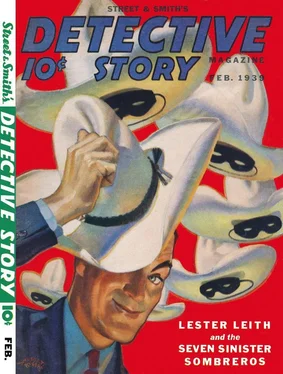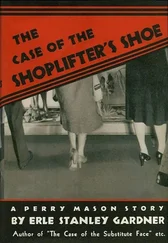Erle Gardner - The Seven Sinister Sombreros
Здесь есть возможность читать онлайн «Erle Gardner - The Seven Sinister Sombreros» весь текст электронной книги совершенно бесплатно (целиком полную версию без сокращений). В некоторых случаях можно слушать аудио, скачать через торрент в формате fb2 и присутствует краткое содержание. Город: New York, Год выпуска: 1939, Издательство: Street & Smith Publications, Жанр: Классический детектив, на английском языке. Описание произведения, (предисловие) а так же отзывы посетителей доступны на портале библиотеки ЛибКат.
- Название:The Seven Sinister Sombreros
- Автор:
- Издательство:Street & Smith Publications
- Жанр:
- Год:1939
- Город:New York
- ISBN:нет данных
- Рейтинг книги:4 / 5. Голосов: 1
-
Избранное:Добавить в избранное
- Отзывы:
-
Ваша оценка:
- 80
- 1
- 2
- 3
- 4
- 5
The Seven Sinister Sombreros: краткое содержание, описание и аннотация
Предлагаем к чтению аннотацию, описание, краткое содержание или предисловие (зависит от того, что написал сам автор книги «The Seven Sinister Sombreros»). Если вы не нашли необходимую информацию о книге — напишите в комментариях, мы постараемся отыскать её.
The Seven Sinister Sombreros — читать онлайн бесплатно полную книгу (весь текст) целиком
Ниже представлен текст книги, разбитый по страницам. Система сохранения места последней прочитанной страницы, позволяет с удобством читать онлайн бесплатно книгу «The Seven Sinister Sombreros», без необходимости каждый раз заново искать на чём Вы остановились. Поставьте закладку, и сможете в любой момент перейти на страницу, на которой закончили чтение.
Интервал:
Закладка:
Erle Stanley Gardner
The Seven Sinister Sombreros

Chapter I.
The Drugged Guard.
Lester Leith lifted the lid from the humidor of carved ivory which held his cigarettes. Gently tapping the tip of a cigarette on his thumbnail, he snapped a match into flame, sucked in a deep inhalation of fragrant smoke, and started blowing smoke rings.
Men who have lived together in months of intimate association learn to know each other’s habits with an almost clairvoyant perception; and Edward Beaver, the police undercover man, who had so long been masquerading as Lester Leith’s valet, watched him with glittering eyes. Experience had taught him that if Lester Leith should start tracing the perimeters of those smoke rings with the tip of his extended forefinger, the time would be ripe to trap the man upon whom he spied. That trap had already been set. It remained only for the spy to bait it by interesting Leith in a crime problem which had been carefully selected by Police Sergeant Ackley as the pitfall which would lead the unsuspecting victim to his undoing.
Twice, three times, Lester Leith blew smoke rings, and contented himself with watching their upward progress as they twisted and writhed on themselves, finally to disperse in a blue haze.
“Scuttle,” he said.
The undercover man had a particular aversion to this nickname which Leith had given him because of a fancied resemblance to an ancient pirate. Swift irritation showed on his face, then vanished as Lester Leith’s right hand claimed his beady-eyed fascination.
The well-manicured tip of Leith’s extended forefinger meditatively traced the perimeter of one of the writhing smoke rings, unmistakable indication that his chain-lightning mind, bored with matters of everyday routine, was groping for some exciting new stimulus.
“Scuttle,” Lester Leith said the second time.
“Yes, sir,” the spy answered quickly, stepping from the table he had been dusting to be where he could face the slender, well-knit figure that was seated in the big, overstuffed leather chair.
“Scuttle,” Lester Leith said, “I’ve never fully interrogated you concerning your last escapade with Sergeant Ackley. Tell me, Scuttle. Did he really suspect me of hijacking those gems?”
The spy grasped the opportunity. “I’m afraid he did, sir. If I might be pardoned for making the suggestion, sir, Sergeant Ackley is altogether too petty a person to interfere with your plan of life.”
“Interfere with my plan of life, Scuttle!” Lester Leith exclaimed, half turning in his chair. “What the devil are you talking about? Sergeant Ackley is like an irritating housefly in drowsy weather — an annoyance, to be sure; an obstacle never.”
“Yes, sir. But since you have such an extraordinary ability to read the newspaper accounts of crime and spot the criminals from the facts reported, it seems such a shame to give up your hobby just because— Well, pardon me, sir. Perhaps I shouldn’t mention it.”
Leith nodded slow affirmation. “You’re right, Scuttle,” he said.
“You mean about letting Sergeant Ackley interfere with your plan of life?” the spy asked eagerly.
“No,” Lester Leith said, blowing another smoke ring. “About the fact that you shouldn’t mention it.”

The spy’s face darkened, but since he had been particularly commissioned by Sergeant Ackley to direct Lester Leith’s attention to the strange case of the drugged guard, he dared not let any distraction divert Lester Leith’s mind from the channel on which the spy knew it was about to embark.
“Yes, sir,” he said. “I beg your pardon. It was presumptuous of me, a resentment against Sergeant Ackley, because there are so many interesting crimes in the papers these days.”
Leith glanced up quickly. “Scuttle, you tempt me.”
“Pardon me, sir. I had no intention of doing so.”
“Damn it,” Lester Leith said irritably. “Why can’t Sergeant Ackley quit his confounded suspicions? I have repeatedly explained to him that my interest in crime is only academic. Yet he thinks my charitable donations are sustained by funds adroitly hijacked from criminals. I presume Ackley feels criminals should be allowed to retain their ill-gotten loot. I don’t. Personally I think this mysterious hijacker is a public benefactor, regardless of whether the hijacked funds eventually find their way into charitable causes or not. I suppose it’s illegal, but, damn it, it’s poetic justice.”
“Yes, sir. I quite agree with you, sir.”
“Hang it, Scuttle,” Lester Leith said. “You’re catching me a most inopportune moment. Perhaps it’s my mood. Perhaps it’s the weather. Damn it, Scuttle! To what specific crimes are you referring?”
For a moment, the undercover man regarded Lester Leith with the expression of an angler surveying a choice pool of water in which he knows there lurks a very large and wary trout. Experience had taught him that Lester Leith seldom rose to the first lure which he offered. But, now, there was something in Leith’s mood which made the spy feel it might be possible to launch at once into the affair of the drugged guard.
“There have been several crimes,” he hedged.
“Well, pick the most interesting, Scuttle. I’m not going to permit my mind to dwell on it, but I can at least hear about it.”
“Yes, sir,” the spy said, and his big hand, pushing down into the inside pocket of his coat, dragged out a sheaf of newspaper clippings.
Leith said irritably: “Scuttle, you’re still clipping crime news and carrying the clippings around with you. I told you not to do that any more.”
“Yes, sir. If you’ll pardon me, sir, these were not clipped for your consideration. You’ve got me started, if you don’t mind my saying so, sir.”
“Got you started, Scuttle?”
“Yes, sir. Of course, I realize I can never attain even a fraction of your efficiency, but the crime news has come to exercise a fatal fascination for me. I can’t help thinking of how easy it is for you to study the facts in a newspaper, spot the real criminal, and then outline a scheme by which that criminal might be apprehended; a scheme by which unusual objects betray the criminal to his own destruction.”
Lester Leith stared at the huge figure of the police spy with thought-slitted eyes. “Scuttle,” he said, “you’re almost stealing my thunder.”
“Oh, no, sir! Not at all, sir! My own efforts are most clumsy and utterly inadequate. I was merely explaining how I happened to have these crime clippings so readily available.”
“But you’re duplicating my methods, Scuttle.”
“Oh, no, sir, not duplicating! It’s a feeble imitation, sir.”
“Oh, well, let it pass,” Lester Leith said. “What crime did you have in mind as being so interesting, Scuttle?”
“The affair of the missing heiress, sir.”
“Who’s the heiress. Scuttle?”
“Miss Blodson-Hess.”
“And what about Miss Blodson-Hess, Scuttle?”
“She vanished. No one seems to know what has happened to her, but it’s generally known that shortly before her disappearance she drew out large sums of cash.”
“A man in the case, Scuttle?”
“Yes, sir. She was engaged to be married next week, and the man is naturally all broken up over it.”
Lester Leith yawned. “Naturally, Scuttle,” he agreed, “one would expect him to be, but his interest robs the case of its fascination for a student of crime. There’s altogether too much emotion in it, Scuttle. Your perfect crime is one of coldblooded deliberation, of cool, calm reasoning — speaking, of course, from the standpoint of a connoisseur of crime, Scuttle. What else do you have?”
Читать дальшеИнтервал:
Закладка:
Похожие книги на «The Seven Sinister Sombreros»
Представляем Вашему вниманию похожие книги на «The Seven Sinister Sombreros» списком для выбора. Мы отобрали схожую по названию и смыслу литературу в надежде предоставить читателям больше вариантов отыскать новые, интересные, ещё непрочитанные произведения.
Обсуждение, отзывы о книге «The Seven Sinister Sombreros» и просто собственные мнения читателей. Оставьте ваши комментарии, напишите, что Вы думаете о произведении, его смысле или главных героях. Укажите что конкретно понравилось, а что нет, и почему Вы так считаете.












